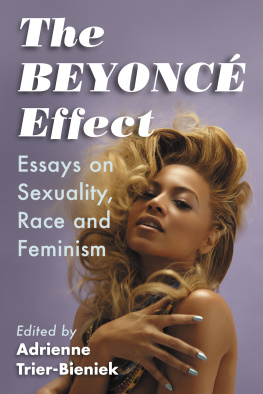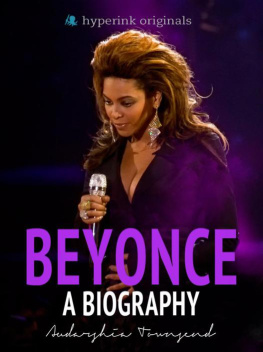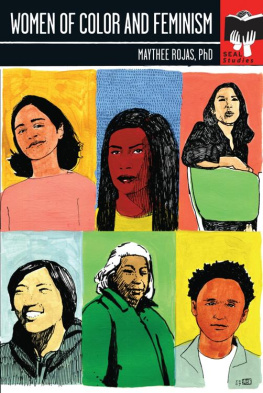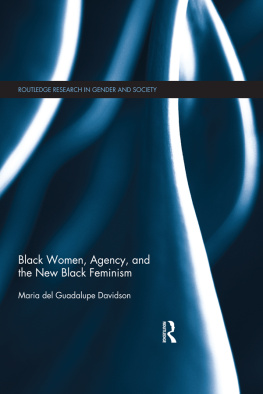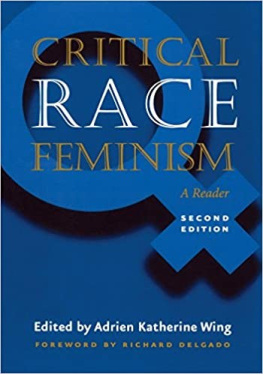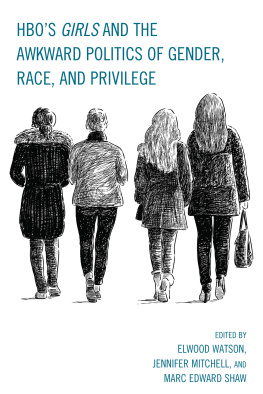
The Beyonc Effect
Essays on Sexuality, Race and Feminism
Edited by Adrienne Trier-Bieniek

McFarland & Company, Inc., Publishers
Jefferson, North Carolina
LIBRARY OF CONGRESS CATALOGUING DATA ARE AVAILABLE
BRITISH LIBRARY CATALOGUING DATA ARE AVAILABLE
e-ISBN: 978-1-4766-2558-4
2016 Adrienne Trier-Bieniek. All rights reserved
No part of this book may be reproduced or transmitted in any form or by any means, electronic or mechanical, including photocopying or recording, or by any information storage and retrieval system, without permission in writing from the publisher.
Front cover: Beyonc Knowles, 2011 (Photograph by Tony Duran, Parkwood Pictures Entertainment LLC)
McFarland & Company, Inc., Publishers
Box 611, Jefferson, North Carolina 28640
www.mcfarlandpub.com
For my friend Jennifer Wiles,
Official Defender of Human Rights.
Acknowledgments
Thanks go to all the contributors to this text for sharing their expertise and talent. Each essay is a reflection of outstanding scholarship and I have learned so much from all of you. It has been a privilege to work with you. An extra special thank you to Tia Tyree and Rachel Griffin for their help in recruitment.
Many thanks to my personal book-editing mentor, unofficial book-editing champion and feminist partner-in-crime Patricia Leavy. I also thank Angie Moe, the greatest dissertation chair in the universe. Thanks to the usual suspects in my life for their support: my soul-sisters Efua Akoma and Beatrice Yarbrough and their families, Lee Paulsen and family, the Clapper twins, Andy and Dan, and their families, the Spertis, the Triers, the Bienieks, Chastity Orrship, Melissa Sierra and Bethany Kelly. And thanks to my four-legged pals Mara and Charlie for the constant company, and to my two-legged husband Tim Bieniek, who is just as handsome as he was in 1997. You make my heart happy. Thanks to Rick and Deanne Trieryou raised me right.
Vadzim Sheika, your girl is Flawless. Go get that ring.
Catherine Kelly, hopefully this book helps in making your own band. Thanks for being my Galentine.
Finally, the idea for this work was born not just from Beyonc but from watching the women in my life who are embodying the spirit of killing it. Collectively they are academics, nurses, health care providers, costume designers, mothers, attorneys, writers, dancers, police officers, teachers, public servants, business owners, counselors, survivors and community leaders. Thank you all for the inspiration and the continued motivation to be better than I was yesterday.
Introduction
Few contemporary entertainers in the pop music world have had an impact equal to Beyoncs. Her talents as a songwriter and entertainer, coupled with her powerhouse vocals and a desire to challenge gendered norms, has catapulted Beyonc to a level of stardom and influence few performers will ever see. Yet what is perhaps most interesting about her cultural impact is the ways she has embraced feminism. Her songs can be read as mini-lectures in feminist theory and methodologyshe has introduced feminism to new generations of young women and given feminists the world over an opportunity to rally behind a woman who is perhaps the worlds biggest pop star.
Much is connected to the title that comes with Queen Bey. Her lyrics eschew the typical pop music fare and cover topics like womens independence from men, healthy sexuality, post-partum depression, feminism and identity, to name a few. Yet, as diverse as her songs are, the images and statements she makes through her performances and media are perhaps more impactful. Beyonc often tours with an all-female band, something unheard of for a pop star of her caliber. She has mixed her music with speeches from author Chimamanda Ngozi Adichie, a writer whose stance on feminism was highlighted in Beyoncs song Flawless. One December night in 2013, she released her album Beyonc via iTunes without fanfare and without the industry standard press junket that accompanies the release of new albums.
Since her introduction as a member of Destinys Child during the pop music scene of the late 1990s, Beyonc has been a lightning rod for both praise and criticism from scholars, feminists and critics alike. While some see Beyonc as an empowering presence and in every way celebrating the independent women she praises in her music, others view her as detrimental to womens rights, feminism and as a negative portrayal of a woman of color. Recently, feminist theorist and writer bell hooks, during a talk at the New School in New York City, referred to Beyonc as a terrorist and an anti-feminist, and described her image as her collusion in the construction of herself as a slave.
The response to hooks words from the feminist and music community was overwhelmingly critical. Many feel that Beyonc represents a new face of feminism: the woman who forms her own opinions and actions regarding gender equality. As evidence of the relevance of these discussions, academic courses have popped up across the nation focusing on Beyoncs effect on the dialog about race and gender, the female body, sexuality and the politics of media representations. Additionally, much focus has been on Beyoncs philanthropy to help women and girls worldwide via the non-profit project Chime for Change.
These discussions also lend themselves to analysis of Beyoncs presentation of self. They raise debate about the place of a Black woman in the music industry, as well as of the wealth and privilege she has gained via her marriage to Jay-Z. Arguments about her ability to represent Blackness have abounded almost as frequently as deliberations about her use of sex and sexuality in her songs. Some scholars posit that Beyonc is owning her sexuality while others argue that her status as a married woman allows her the privilege to talk about her sex life, or that she is a product of the male gaze, requiring submission to hegemonic media culture. Much focus has also rested on her body, everything from politicizing nudity in her videos to sensual performances on stage. Beyonc-inspired body politics challenges notions of race and gender, questioning whether her body (naked or clothed) is oppressive or empowering.
Additionally, Beyonc has become the focus of debate surrounding theories of intersectionality and privilege, raising the question Does fame cancel out inequality based on race, class or gender? This collection of essays focuses on these concepts, offering an analysis of Beyonc the person, the entertainer and the brand, and examining the music industrys representation of gender and Beyoncs connection with her fans.
A Brief Biography of Beyonc Knowles
Beyonc Giselle Knowles-Carter was born on September 4, 1981, in Houston, Texas. She began her musical career at the age of eight, as part of an all-girl group that would eventually become known as Destinys Child. Their massive success throughout the 1990s and early 2000s led to Destinys Child being named by Billboard magazine one of the most popular female groups of all time. The group became famous for songs like Independent Women, which praised womens financial independence and urged female listeners to depend only on themselves. Their song Survivor was released after the members had a falling out and media reports about cat fighting among the group led Beyonc to write the song, declaring that the group had chosen to focus on the positive and survive. Eschewing support from others became a theme of the trios music.
Next page
